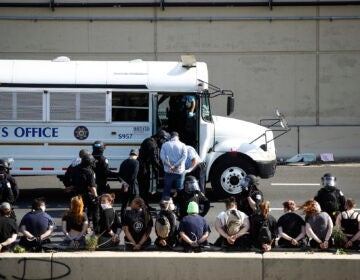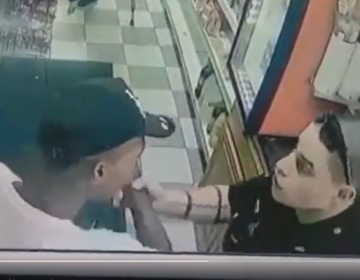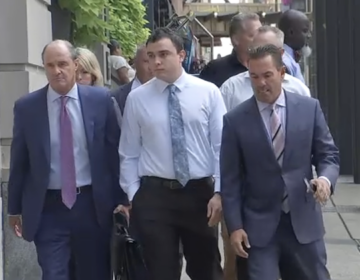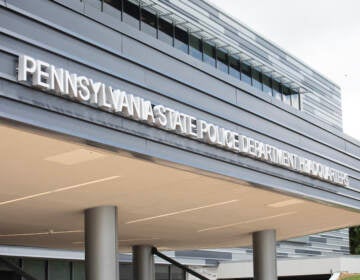I got shot with a rubber bullet by police. It was a painful lesson about white supremacy
Getting hit by a rubber bullet helped Judith Max Palmer understand the wanton violence that Black communities experience too often at the hands of police.
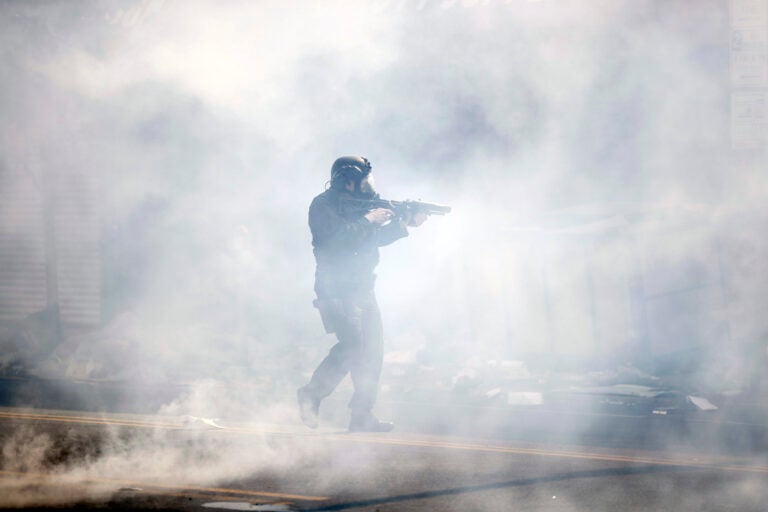
A police officer moves through tear gas deployed to disperse a crowd as Justice for George Floyd Philadelphia protests continue Sunday, May 31, 2020, in Philadelphia. (AP Photo/Matt Rourke)
This essay is part of a collection of stories exploring people’s relationships with policing across Philadelphia. The first essay in the series explores interactions with police while homeless.
On May 31, 2020, Philadelphia police shot me with a rubber bullet for filming a protest in West Philadelphia, a couple of blocks from my house. Or maybe just for standing there. It was the kind of ammunition police call “less-than lethal,” as though “lethal” should be the benchmark for police use of force. In the split second that the rubber bullet hit my leg, I was transformed from an engaged bystander in the fight against police violence to an actual victim of police brutality. The officers whose role it is to protect and serve, shot me for simply recording their behavior; behavior that is fundamentally violent and unaccountable to the very public they have sworn to serve. There was no warning. There was no apology. There was just the violence that Black and brown Philadelphians experience from the police every single day.
Even after years of activism, even after I was moved to racial justice work, that shot hit me hard. I understood police violence in a different way than you can learn from only reading and listening. This kind of wanton physical violence — and far worse — by the people who are tasked with protecting us is the everyday reality of so many people in this country. I was already committed to this work, but now it is personal.
Growing up, I was no goodie-two-shoes — I got into my fair share of trouble. When I was 19, I was caught shoplifting. I got yelled at, but no one called the cops. Not long after, cops found me passed out drunk on the street after a party. They wrapped me in a blanket and took me home. What would have happened had I not been a white woman?
The abject failure of the police to implement anything like a fair, impartial enforcement of law was on display on Jan. 6, as Trump supporters easily overwhelmed the feeble resistance of Capitol police. Images of the militarized preparations for the previous Black Lives Matter march flooded social media, juxtaposed against reports that the Justice Department had offered support to the Capitol police, and been refused. Other images included law enforcement officers opening barrier gates for the rioters and taking selfies with them. The whole debacle illustrated, for me, the reason that the police are fundamentally incapable of reforming themselves: They look at white supremacists who are bent on toppling our democracy as their brothers and cousins, and cannot effectively resist them; at the same time, they see Black people, and those who endorse their humanity, as a threat.
Growing up in Seattle, most of the people I spent time with were white. I was a freshman in high school when police beat up Rodney King on video, and got away with it. I was horrified, not just by what happened to King, but by the idea that something like that could still happen in America. It might sound crazy that I thought racist police violence was something of the past, but a lot of white people grow up with that message. The reality wouldn’t really sink in until years later.
I began to understand the state of policing in the United States more clearly 10 years ago when I moved to Philadelphia. I read Michelle Alexander’s The New Jim Crow, I read Angela Davis, researched the MOVE bombing. Then Ferguson happened. Then Donald Trump’s racist campaign. I got involved in Reclaim Philadelphia and began attending Police Advisory Commission meetings. I listened to my Black friends and colleagues and I began to understand my country in a different way. To understand the centuries of insulation that white supremacy has built around itself, you have to stand in protest and solidarity with Black folks, demand change, and see firsthand how cops treat Black people.
The first thing you learn when you start doing police accountability work is that the Fraternal Order of Police (FOP) is there to protect officers — no matter what. In 2015, a 20-year-old college student named Philippe Holland was working as a deliveryman a few blocks from my home. He had just dropped off a cheeseburger when he tried to drive away from some people he thought were trying to rob him. They turned out to be undercover cops. And they shot him, leaving bullet fragments in his brain and permanently disabling him. Like the rest of the community, I was outraged by what happened. But my initial anger paled in comparison to what I felt when it became clear that while city taxpayers would pay out a $4.4 million settlement to Holland there would be no consequences for the police, thanks to protections in the contract.
The FOP is known as the police union, but it is unlike most labor unions in that it shields the workers it represents from the public rather than from a corporate boss. After the murder of George Floyd on camera and the massive outpouring of resistance to police violence that followed, mainstream unions finally began to distance themselves from the FOP.
For my Black neighbors, the police represent a constant threat. They are the opposite of what I had experienced back home. The police occupy Black neighborhoods, treating residents like the enemies of the state. Abuse and violence like I had tasted with that rubber bullet on May 31 are constant, ongoing, day and night. When people try to hold the police accountable through the system, the FOP is there to stop us. It is an infuriating feeling of powerlessness, watching bullies abuse people and power, when the bullies have the badges and guns and the rules are set up in their favor.
In September, Reclaim Philadelphia launched the #CommunityControlNow campaign for police accountability with a mission to change this deadly status quo.
In Pa., one major obstacle to holding police accountable is Act 111, a law passed in 1968 which led to police officers being able to have disciplinary decisions overturned through a process called grievance arbitration. But many other obstacles don’t rest on laws like Act 111. Often, the problem is people in local government preferring not to ruffle feathers and coming up with reasons why they can’t act. But we can make them act.
When Laquan McDonald was murdered in Chicago, protests pressured the courts to make police release the dashcam footage, and when that came out, and civic actions escalated, Jason Van Dyke became one of the very few cops convicted of murder for shooting an unarmed Black person. Police can be held accountable, but there are so many roadblocks in our way it’s only going to happen if we stand up and fight back together. And we must demand that members of City Council, state legislators, attorneys, and everyone who has a role in holding police accountable, do so.
We know it’s possible to build communities where every person is free to live and thrive, but it’s going to take all of us standing up and speaking out together to get there. We have to act: The only question is how fast, and how much injustice goes on every day until we stop it. We can hold them accountable, and we have to start yesterday.
Judith Max Palmer is a medical social worker and police accountability activist in Philadelphia. She lives in Cobbs Creek with her spouse and two stepchildren.

Subscribe to PlanPhilly
WHYY is your source for fact-based, in-depth journalism and information. As a nonprofit organization, we rely on financial support from readers like you. Please give today.



